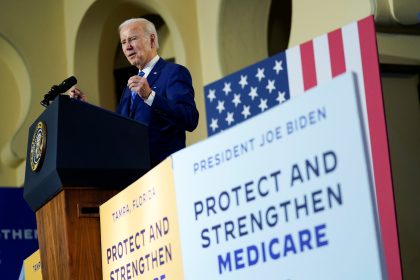Kagan Says Congress Must Fix Medicare Dialysis Rule ‘Broken’ by Her Colleagues

WASHINGTON — Supreme Court Justice Elena Kagan on Tuesday called on Congress to “fix” the Medicare Secondary Payer Act after a majority of her colleagues ruled a group health plan did not violate the act by providing only limited benefits for outpatient dialysis treatment.
Igniting her ire was a 7-2 decision written by Justice Brett Kavanaugh, that ended litigation filed by DaVita — a major provider of dialysis services — against the Marietta Memorial Hospital Employee Health Benefit Plan.
In its 2018 lawsuit, DaVita argued that the plan’s limited coverage for outpatient dialysis both differentiates between individuals with and without end-stage renal disease and takes into account the Medicare eligibility of individuals with end-stage renal disease in violation of the Medicare Secondary Payer statute.
Under the provisions of the act, Medicare is a “secondary” payer to an individual’s existing insurance plan for certain medical services, including dialysis, when that plan already covers the same services.
To prevent plans from circumventing their primary-payer obligation for end-stage renal disease treatment, the statute imposes two constraints relevant to this case.
First, a plan “may not differentiate in the benefits it provides between individuals having end-stage renal disease and other individuals covered by such a plan on the basis of the existence of end-stage renal disease, the need for renal dialysis or in any other manner,” Kavanaugh wrote.
Second, a plan “may not take into account that an individual is entitled to or eligible for” Medicare due to end-stage renal disease.
A federal court dismissed DaVita’s claims that the Marietta Plan violated both statutory constraints, but a divided 6th U.S. Circuit Court of Appeals reversed that ruling.
In doing so the 6th Circuit held the statute authorized disparate-impact liability and that the limited payments for dialysis treatment had a disparate impact on individuals with end-stage renal disease.
But Kavanaugh saw the disparate-impact theory “not only is atextual but also would be all but impossible to fairly implement.”
“The premise of the disparate-impact theory is that the plan’s benefits for outpatient dialysis are inadequate. But what level of benefits would be adequate, and how would courts determine the level of benefits that qualifies as adequate?” the justice wrote.
“Neither the statute nor DaVita offers a basis for determining when coverage for outpatient dialysis could be considered inadequate. And neither the statute nor DaVita supplies an objective benchmark or comparator against which to measure a plan’s coverage for outpatient dialysis,” he continued.
“Absent some benchmark or comparator, courts would have great difficulty trying to make an apples-to-apples comparison of a plan’s coverage for outpatient dialysis against its coverage for other services,” Kavanaugh said.
“Group health plans cover services for many different health issues at varied rates. Those rates may reflect negotiations with third parties, the needs of a particular plan’s beneficiaries, and other factors such as geography,” he said. “Courts would be entirely at sea in trying to determine an appropriate benchmark or comparator for outpatient dialysis.
“Put simply,” he concluded, “DaVita’s approach is a prescription for judicial and administrative chaos.”
But where Kavanuagh saw logic, Kagan saw her colleagues creating “a massive and inexplicable workaround.”
“The MSPA instructs that a group health plan ‘may not differentiate in the benefits it provides between individuals having end-stage renal disease and other individuals covered by such plan on the basis of the existence of end-stage renal disease, the need for renal dialysis or in any other manner,’” she wrote.
“The majority holds that the plan here does not so ‘differentiate’ because it draws distinctions only between dialysis and other treatments — not between individuals with end-stage renal disease and individuals without it. That conclusion flies in the face of both common sense and the statutory text.”
For Kagan, one fact is key to understanding the case — that outpatient dialysis is an almost perfect proxy for end-stage renal disease.
“Virtually everyone with end-stage renal disease — and hardly anyone else — undergoes outpatient dialysis,” she said. “Ninety-seven percent of people diagnosed with end-stage renal disease — all those who do not obtain a preemptive kidney transplant — undergo dialysis. … And 99.5% of DaVita’s outpatient dialysis patients have or develop end-stage renal disease.
“Because that is so, common sense suggests that we should not care whether a health plan differentiates in benefits by targeting people with end-stage renal disease, or instead by targeting the use of dialysis. When ‘status and conduct’ are proxies for each other, ‘our decisions have declined to distinguish’ between them.
“And if common sense were not enough, statutory text would come to the rescue,” Kagan continued. “Congress was well aware of the relationship between end-stage renal disease and dialysis — and the text it wrote reflects that knowledge.
“The statute proscribes not just differentiation ‘on the basis of the existence of end-stage renal disease,’ but also “on the basis of … the need for renal dialysis, or in any other manner. The back half of that provision prevents exactly the circumvention the majority today allows. It bars plans from differentiating between people with and without end-stage renal disease even when that differentiation is accomplished indirectly — by targeting their treatment, or by relying on some other proxy for the condition.
“So contrary to the majority, the statutory text does indeed prohibit differentiation as to services — and not only as to individuals. … That reading also fits with the statute’s purpose,” she wrote.
“As the majority recognizes, the MSPA’s renal disease provisions were designed to prevent plans from foisting the cost of dialysis onto Medicare.Yet the court now tells plans they can do just that, so long as they target dialysis, rather than the patients who rely on it, for disfavored coverage. Congress would not — and did not — craft a statute permitting such a maneuver,” Kagan concluded.
Dan can be reached at [email protected] and @DanMcCue
























